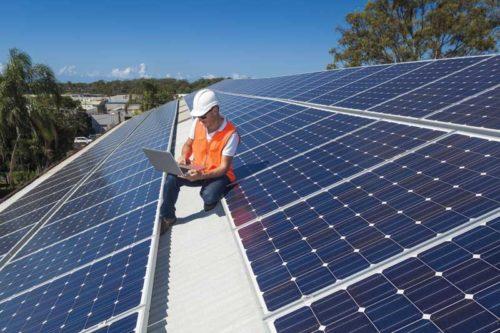Solar panels have become a popular and sustainable energy solution for homeowners. As more people consider installing solar panels on their roofs, questions arise regarding the compatibility of solar panels with different roofing materials. One such concern is whether you can install solar panels on a metal roof. In this article, we’ll explore the feasibility and advantages of placing solar panels on a metal roof, as well as any specific considerations you should keep in mind.

The Popularity of Solar Panels
Solar panels, or photovoltaic (PV) panels, are devices that harness sunlight to generate electricity. They have gained popularity due to their ability to reduce electricity bills, decrease reliance on non-renewable energy sources, and lower a household’s carbon footprint. Installing solar panels on a suitable roof is a significant step toward embracing clean and sustainable energy.
Advantages of Metal Roofs for Solar Panels
Metal roofs have gained favor among homeowners for various reasons. These advantages also make them an excellent choice for accommodating solar panels:
- Durability: Metal roofs are known for their durability and longevity. They can last for 40-70 years, which aligns well with the lifespan of solar panels.
- Weight: Metal roofs are lightweight compared to some other roofing materials, making them compatible with the weight of solar panels.
- Energy Efficiency: Metal roofs reflect solar heat, which can reduce cooling costs and improve the efficiency of solar panels.
- Easy Installation: The smooth and even surface of metal roofs makes the installation of solar panels relatively straightforward.
- Weather Resistance: Metal roofs are highly resistant to various weather conditions, including rain, snow, and hail, which ensures the protection of your solar investment.
Considerations for Installing Solar Panels on a Metal Roof
While metal roofs are generally conducive to solar panel installation, several factors should be taken into account:
- Roof Condition: Before installing solar panels, it’s essential to ensure that your metal roof is in good condition. Any pre-existing issues, such as leaks or rust, should be addressed beforehand.
- Weight-Bearing Capacity: While metal roofs are lightweight, the weight-bearing capacity of your roof’s structure should be assessed to support the added weight of solar panels.
- Attachment Method: There are various methods to attach solar panels to a metal roof. Common options include exposed fasteners, standing seam clamps, and ballasted racking systems. Consult with a professional to determine the most suitable method for your roof.
- Warranty: Check whether installing solar panels will affect the warranty on your metal roof. Some roofing manufacturers may have specific guidelines regarding solar panel installation.
- Ventilation: Proper roof ventilation is crucial to prevent heat buildup between the solar panels and the roof. This can be especially important for metal roofs, as they can become very hot in the sun.
The Installation Process
The installation of solar panels on a metal roof typically involves the following steps:
- Roof Assessment: A professional will assess the condition of your roof to determine its suitability for solar panel installation.
- Design: The solar panel system will be designed to fit the available roof space and optimize energy production.
- Permitting: Necessary permits and approvals will be obtained from local authorities.
- Installation: Solar panels will be securely mounted on your metal roof using the chosen attachment method.
- Wiring: Electrical connections will be made, linking the solar panel system to your home’s electrical system.
- Inspection and Activation: A final inspection will ensure that the system is properly installed, and then it will be activated to start generating electricity.
Conclusion
Installing solar panels on a metal roof is a practical and energy-efficient choice. Metal roofs offer numerous advantages, including durability, energy efficiency, and weather resistance. However, specific considerations, such as roof condition, weight-bearing capacity, attachment methods, and warranty concerns, must be addressed. By working with a qualified solar installation professional, you can make the most of your metal roof and harness the power of the sun to reduce your energy costs and environmental impact.



Leave a Reply